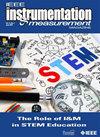Basics of Industrial Metrology
IF 1.6
4区 工程技术
Q3 ENGINEERING, ELECTRICAL & ELECTRONIC
引用次数: 0
Abstract
As known, cyber-physical systems and ICT technologies in general are the backbone of the fourth industrial revolution (also known as Industry 4.0 in Europe). However, flexibility, efficiency, resilience and, above all, high-quality smart manufacturing could not be achieved without the essential contribution of measurement science. This is supposed to play a key role also for the development of value-centric, fully sustainable organizations envisioned in the forthcoming fifth industrial revolution. The most recent measurement techniques and technologies (e.g., networked and distributed measurement systems, advanced sensing solutions, machine-learning-based diagnostic solutions) supporting process and product monitoring in smart manufacturing companies are essential to reach specified quality targets and/or to ensure compliance with given technical, regulatory or legal requirements. Industrial metrology comprises all organizational and measurement procedures, techniques and technologies that contribute to reach the aforementioned goals, thus improving both customers' satisfaction and company competitiveness. In [1], Savio et al. highlight the strong economic benefits of industrial metrology in four different case studies. In particular, it turns out that, despite relevant initial investments, Internal Return Rates (RRs) ranging between 20% and 44% can be achieved with payback times shorter than three years. A pre-Brexit survey reports that UK companies using measurement standards are twice as likely to export goods compared with companies of the same size that instead make a marginal use of metrology within their processes, with an estimated impact on yearly turnover that ranges from 1.7% to 5.3% [2].工业计量基础
众所周知,网络物理系统和信息通信技术通常是第四次工业革命(在欧洲也被称为工业4.0)的支柱。然而,如果没有测量科学的重要贡献,灵活性、效率、弹性以及最重要的高质量智能制造是无法实现的。在即将到来的第五次工业革命中,这对于以价值为中心、完全可持续的组织的发展也应该发挥关键作用。智能制造公司中支持过程和产品监控的最新测量技术和技术(例如,网络化和分布式测量系统,先进的传感解决方案,基于机器学习的诊断解决方案)对于达到指定的质量目标和/或确保符合给定的技术,法规或法律要求至关重要。工业计量包括有助于实现上述目标的所有组织和测量程序、技术和技术,从而提高客户满意度和公司竞争力。在b[1]中,Savio等人在四个不同的案例研究中强调了工业计量的强大经济效益。特别是,事实证明,尽管有相关的初始投资,内部回报率(RRs)在20%到44%之间,投资回收期短于三年。英国脱欧前的一项调查报告称,使用计量标准的英国公司出口货物的可能性是同等规模的公司的两倍,而不是在其流程中边际使用计量,估计对年营业额的影响在1.7%到5.3%之间。
本文章由计算机程序翻译,如有差异,请以英文原文为准。
求助全文
约1分钟内获得全文
求助全文
来源期刊

IEEE Instrumentation & Measurement Magazine
工程技术-工程:电子与电气
CiteScore
4.20
自引率
4.80%
发文量
147
审稿时长
>12 weeks
期刊介绍:
IEEE Instrumentation & Measurement Magazine is a bimonthly publication. It publishes in February, April, June, August, October, and December of each year. The magazine covers a wide variety of topics in instrumentation, measurement, and systems that measure or instrument equipment or other systems. The magazine has the goal of providing readable introductions and overviews of technology in instrumentation and measurement to a wide engineering audience. It does this through articles, tutorials, columns, and departments. Its goal is to cross disciplines to encourage further research and development in instrumentation and measurement.
 求助内容:
求助内容: 应助结果提醒方式:
应助结果提醒方式:


